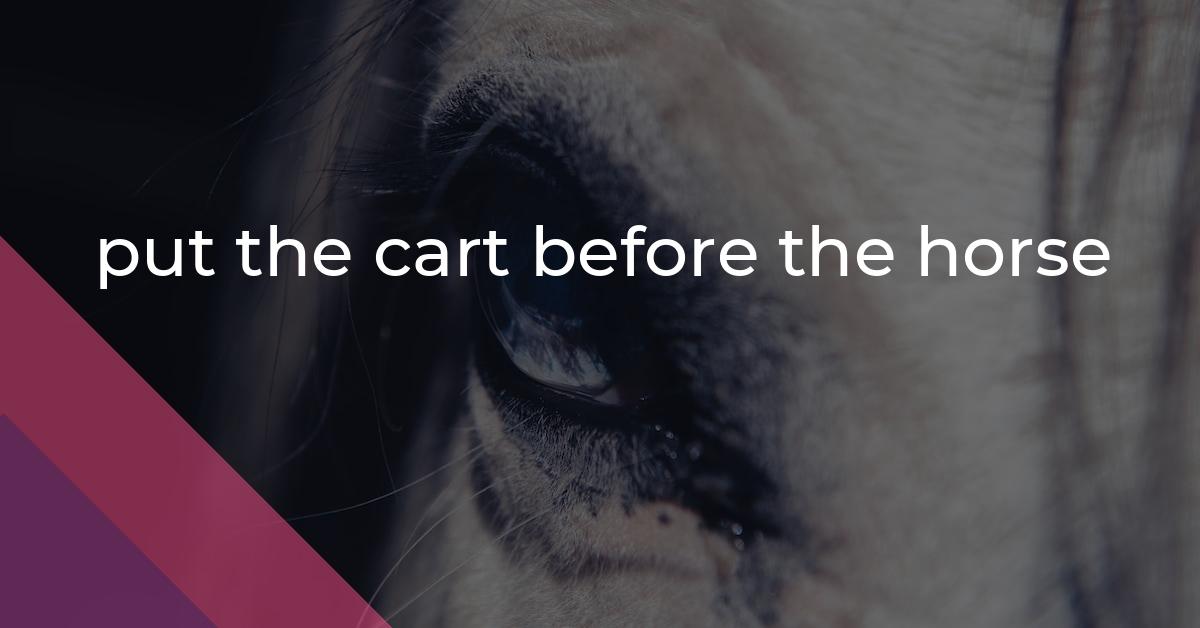put the cart before the horse: Idiom Meaning and Origin
What does ‘put the cart before the horse’ mean?
When someone puts the cart before the horse, they are doing things in the wrong order or confusing cause and effect.

Idiom Explorer
The idiom "upset the applecart" means to disrupt or spoil a carefully planned or established situation, often resulting in chaos or disorder.
The idiom "rearrange the deck chairs on the Titanic" means to focus on insignificant or futile tasks instead of addressing the main issue at hand.
The idiom "put the cat among the pigeons" means to do or say something that causes confusion, trouble, or controversy, resulting in a chaotic or unsettled situation.
To "put the bottom rail on top" means to reverse the order of things or to change the established hierarchy. It implies a significant shift in power or authority.
The idiom "put one foot in front of the other" means to continue moving forward, especially in the face of challenges or difficult circumstances, by taking one step at a time.
The idiom "play first fiddle" means to have the dominant or leading role in a situation or group.
The idiom "pearls before swine" means to offer something valuable or precious to someone who can't appreciate or understand its worth.
The idiom "pave the road to hell" means that even though someone may have good intentions, their actions or decisions can ultimately lead to negative consequences or harm.
The idiom "paint the wagon" means to divert attention, usually by engaging in a secondary activity or creating a distraction, in order to avoid addressing or resolving an underlying problem or issue.
The idiom "out of order" means that something is not functioning or working correctly. It can refer to a broken machine, a disrupted schedule, or improper behavior.
Chaotic Marvel Unleashed
The idiom "put the cart before the horse" is a commonly used phrase in American English. It describes the act of doing things in the wrong order or prioritizing a less important task before a more important one. In essence, it means to have things out of sequence.
One important fact to note about this idiom is that its origins trace back to ancient times. The concept behind it is universal and intuitively understood, as seen in various forms across different cultures. However, the specific wording and variations differ across languages and historical periods.
In the English language, the idiom "put the cart before the horse" has been in use since the late 14th century. The earliest citation of this exact phrase can be found in Chaucer's "Troilus and Criseyde" written in the 1380s. This demonstrates its long-standing presence in the English lexicon.
One theory behind the origin of this idiom suggests that it may have originated from the practice of horse-drawn carriages and carts. Placing the cart in front of the horse would be a foolish mistake, as it goes against the natural order and logic of transportation. This literal interpretation has metaphorically extended to refer to any situation where one attempts to do things in the wrong order or prioritizes the less important tasks before the more important ones.
Furthermore, it is worth noting that the idiom has become deeply ingrained in the English language and continues to be used in a variety of contexts. From everyday conversations to literature and media, this idiom is frequently employed to highlight the importance of proper sequencing and prioritization.
The idiom "put the cart before the horse" has a rich history and metaphorical value. It has been in use in the English language for centuries and is still commonly used today. The phrase succinctly captures the essence of doing things in the wrong order or prioritizing less important tasks before more important ones. Its wide usage across cultures and time underscores its significance and relevance in conveying this timeless concept.
The idiom "put the cart before the horse" is related to the idiom "jump before one is pushed". Both idioms convey the idea of acting prematurely. While "put the cart before the horse" refers to doing things in the wrong order, "jump before one is pushed" emphasizes taking action before being compelled to do so.
The idiom "jump the queue" is also related to "put the cart before the horse". It signifies skipping ahead in a line or disregarding the proper order of waiting. Just as putting the cart before the horse disrupts the natural order of things, jumping the queue disrupts the fair and orderly sequence of waiting.
Example usage
Examples:
1. I bought a new car before getting my driver's license. I really put the cart before the horse on that one.
2. The team planned a victory celebration before even playing the final match. They were putting the cart before the horse.
3. My friend started booking hotels for our vacation before we even decided on the destination. He always puts the cart before the horse.
More "Order" idioms



